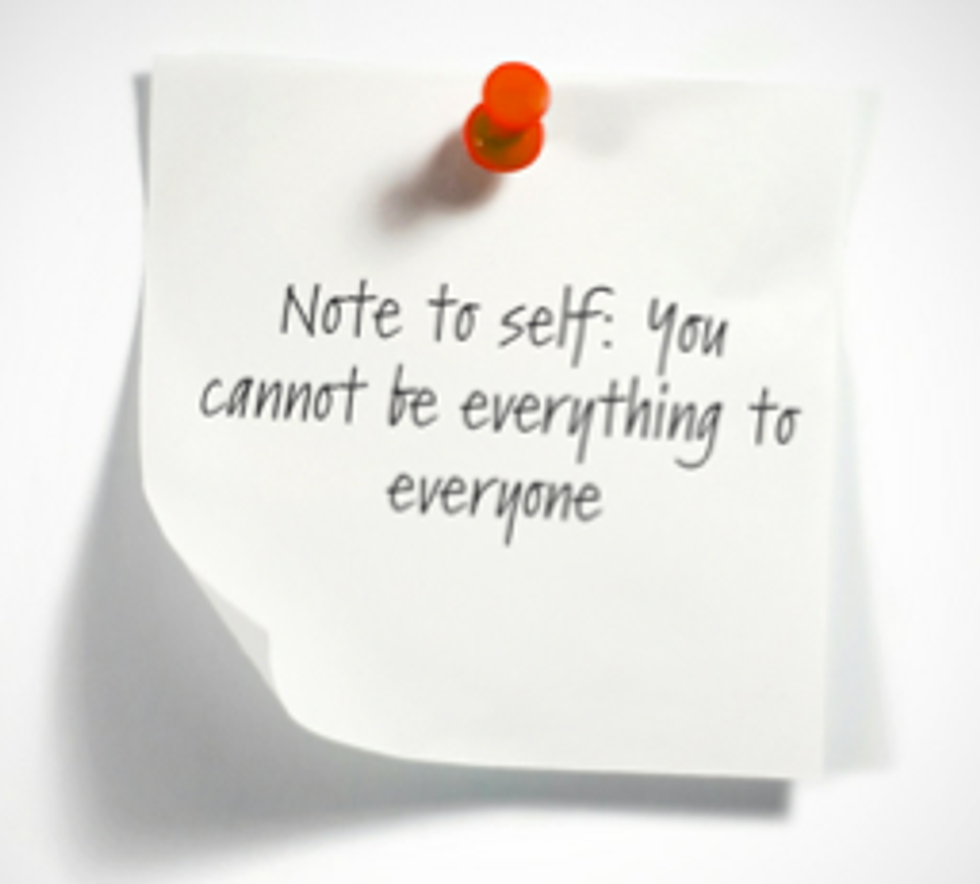N + O = No. Contrary to popular belief, N + O =/= Yes, maybe, sure, or okay. As a chronic people pleaser, I have struggled to even define the word "no," much less say it on a regular basis. Here are a couple ways I have learned to know when to say “no”:
1. Identify Your Savior Complex:
For all you other bleeding hearts, good listeners, and compassionate humans out there, telling a person in need that you aren’t available to help sounds almost impossible- and it is. I constantly find myself surrounded by other people's problems, and honestly, that's just how I like it. When I am diving whole-heartedly into everyone else's hurts, problems, triumphs, and emotions, I am able to conveniently neglect my own. As I try desperately to analyze every facet of someone else's life, as we work through and talk through every option from A-Z, and when I silently listen to someone tell me about their current mental state, I feel useful. I feel complete and needed when I am looking out for other people. However, when I finally come up for air and try to process all the thoughts in my head (usually at 2 am when I am tossing and turning before my 7:30 am alarm), I look around and realize that 98% of them are not my own. And quite frankly, I have no business being involved in that 98% anyways because, no matter what I want to think, they aren't my problems and I can't fix them. Now don't get me wrong, it is really important to be a supportive friend and I still go out of my way to help my friends whenever I can, but I have had to take a hard look at my life and realize the times that I am seeking out others to solve their problems as opposed to the times when people come to me.
2. Saying No Doesn’t Inherently Hurt Other People:
Whenever someone approaches me to ask for my help, if I am free for dinner, or my opinion on their latest boyfriend’s new shirt, I can’t help but say yes to all of the above. It doesn’t matter what I have to get done or how late I’ll have to be up doing it, whenever someone’s friend sent a passive-aggressive text message and needs me “right now” to analyze all possible meanings of each “.” and break down all potential motivations for the emojis chosen (or lack thereof), I immediately feel compelled to rush to their aid.
I feel pressure to drop everything in fear that if I don’t, the person will feel like I don’t care about them. I feel like they will automatically be sad and hurt and feel less important in my life. However, assuming we are dealing with rational and kind-hearted human beings, I have come to find that people would rather you say no! If they find out later that you got sick because you stayed up way too late and you got a bad grade on your exam because you didn’t study enough, all because you were listening to them talk about a problem, it makes them feel bad. Most of the time, had they known what you had to do, they would have insisted you don’t drop everything and instead finish what you need to do.
Learning to say “no” is a difficult but crucial part of growing up. Understanding when saying “no” is beneficial (and needed) can make a world of difference in your life and give you more freedom and perspective. Now, as I mentioned before, as a chronic people pleaser, this is a tall order. My own needs always take the back seat when there is someone that I can help, someone who needs something, or someone who wants to spend time with me. When someone becomes good at saying “no,” the time you spend with them is always a little more relaxed because you know that they aren’t preoccupied and thinking about the other 20 zillion things they need to accomplish before the sun rises.
In the end, saying “no” doesn’t make you a bad person; it makes you a good one.









 The minimum wage is not a living wage.
StableDiffusion
The minimum wage is not a living wage.
StableDiffusion
 influential nations
StableDiffusion
influential nations
StableDiffusion












